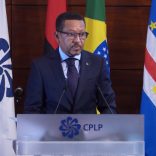Portugal’s Douro Valley winemakers struggle amid U.S. tariffs, export uncertainty
CPLP: Organisation success on own terms; stress on economy ‘stupid’ – researcher

File photo: Lusa
The Community of Portuguese Language Countries (CPLP) can be seen as a success story in terms of its initial aims, while some member goverments’ attempts to stress its economic potential are “stupid”, Fernando Jorge Cardoso, a researcher at the Centre for International Studies at Lisbon’s ISCTE university institute, has told Lusa in an interview.
In a review of 25 years of the CPLP, Cardoso – a former dean of ISCTE who now also works with the Marques de Valle Flôr Institute, said that one’s view of the organisation “depends on the expectations” that were generated a the time of its founding.
“In my expectation, the CPLP is a success [but] for most people, who have economic expectations, it is a disaster,” he told Lusa in an interview. “It is an expectation that is impossible to achieve.
“It is stupid to try to make the CPLP an economic organisation because it is not,” he said, stressing that this was not the objective at its foundation and that most of its members have stronger economic relations with countries outside the CPLP.
Apart from Cabo Verde, Sao Tome and Principe, and Guinea-Bissau, all of whose economic ties with Portugal are central, each member country has other, more important economic partners, he noted.
Thus, Portugal’s “essential relationship is with the European Union, Brazil’s with Mercosur and Mozambique’s with South Africa,” he exemplified, arguing that “there is no point in going against the dictates of geography” for each member country.
“Trying to find an economic community here is a lie that can only be explained by the following: an impossible intention and interests of some businesspeople and some business associations to receive subsidies from the state budgets of the member countries to pretend that they are creating an economic community,” he summarised.
It is true that a country “belonging to multilateral groupings is beneficial for everyone” but each of CPLP member state has other, stronger relationships within its own region.
“The relationship between these countries is less dependent on the CPLP than on these countries themselves,” he explains, while defending the common heritage of the Portuguese language and culture.
Even here, he notes, the picture is complex, given that in not all countries do people mostly speak Portuguese. He cited the example of Mozambique, where “seventeen national languages” coexist.
“To say that these countries are Portuguese-speaking is an insult [and a] lie,” he said, adding that, despite this, “there is indeed an identification of a sentimental and historical nature between people” and this includes the Portuguese language, as the lingua franca, as well as “music or gastronomy” and various “elements of a cultural nature”.
On 16 and 17 July, the CPLP summit of heads of state and government is to be held in Luanda, marking the beginning of Angola’s presidency of the organisation.
That term, according to Cardoso, “should not be substantially different from previous presidencies” but the aim should be to “keep the focus on … expanding the teaching of Portuguese” and seek to “increase cultural and diplomatic exchange between countries.”
The CPLP’s nine member states are Angola, Brazil, Cabo Verde, East Timor, Equatorial Guinea, Guinea-Bissau, Mozambique, Portugal and Sao Tome and Principe.












Leave a Reply
Be the First to Comment!
You must be logged in to post a comment.
You must be logged in to post a comment.